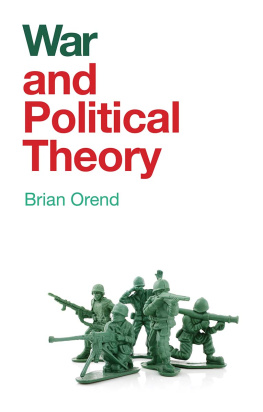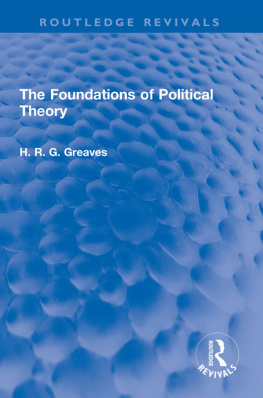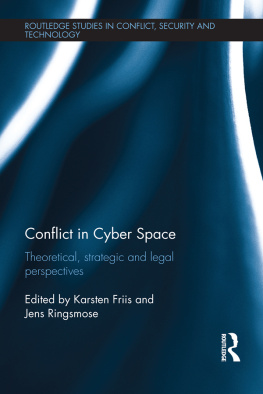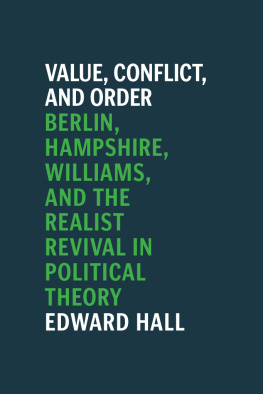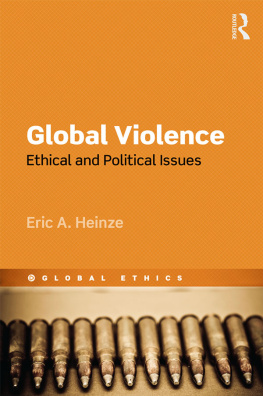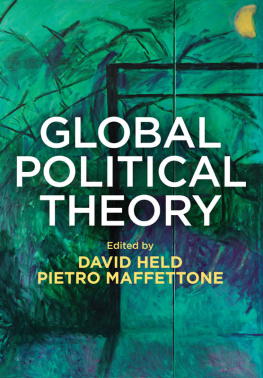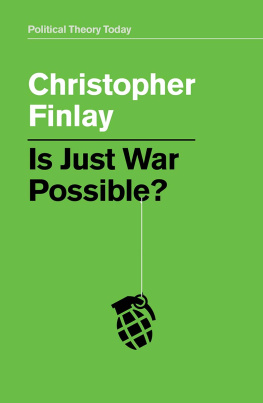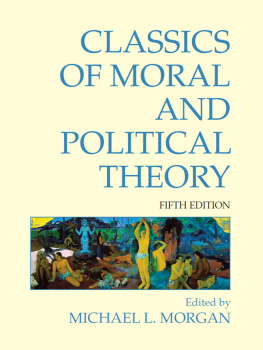CONTENTS
Guide
Pages

And Political Theory series
Hawkesworth, Gender and Political Theory
Orend, War and Political Theory
War and Political Theory
Brian Orend
polity
Copyright Brian Orend 2019
The right of Brian Orend to be identified as Author of this Work has been asserted in accordance with the UK Copyright, Designs and Patents Act 1988.
First published in 2019 by Polity Press
Polity Press
65 Bridge Street
Cambridge CB2 1UR, UK
Polity Press
101 Station Landing
Suite 300
Medford, MA 02155, USA
All rights reserved. Except for the quotation of short passages for the purpose of criticism and review, no part of this publication may be reproduced, stored in a retrieval system or transmitted, in any form or by any means, electronic, mechanical, photocopying, recording or otherwise, without the prior permission of the publisher.
ISBN-13: 978-1-5095-2500-3
A catalogue record for this book is available from the British Library.
Library of Congress Cataloging-in-Publication Data
Names: Orend, Brian, 1971- author.
Title: War and political theory / Brian Orend.
Description: Cambridge, UK ; Medford, MA : Polity Press, 2019. | Series: And political theory | Includes bibliographical references and index.
Identifiers: LCCN 2018039928 (print) | LCCN 2018056307 (ebook) | ISBN 9781509525003 (Epub) | ISBN 9781509524969 | ISBN 9781509524969(hardback) | ISBN 9781509524976(pbk.) | ISBN 9781509525003(ebook)
Subjects: LCSH: War (Philosophy) | Politics and war. | War--Moral and ethical aspects. | Just war doctrine.
Classification: LCC U22 (ebook) | LCC U22 .O638 2019 (print) | DDC 355.0201--dc23
LC record available at https://lccn.loc.gov/2018039928
The publisher has used its best endeavours to ensure that the URLs for external websites referred to in this book are correct and active at the time of going to press. However, the publisher has no responsibility for the websites and can make no guarantee that a site will remain live or that the content is or will remain appropriate.
Every effort has been made to trace all copyright holders, but if any have been overlooked the publisher will be pleased to include any necessary credits in any subsequent reprint or edition.
For further information on Polity, visit our website: politybooks.com
Acknowledgements
Thanks so much to everyone at Polity for helping to bring this book into being. Special thanks to Julia Davies, and extra-special thanks to George Owers, for the initial invitation to join the series and for very helpful, constructive editing efforts. Plus, for patience! Thanks to Neil de Cort for his production expertise, and also to Adam Renvoize for the excellent cover. Thanks so much, too, to my anonymous reviewers and to my copy-editor Ian Tuttle: the result of all the excellent feedback is a much-improved book.
A bit of an unusual dedication but sincerely expressed: Id like very much to thank everyone whos ever invited me to come to their institution to talk about war and peace. Such invitations have been amazingly generous and the source of much stimulation and happiness for me over the years. Thanks again, and heres to the continuing conversation!
Brian Orend
August 2018
Introduction
Our world can seem in constant conflict. Such struggles range from bullying and bitter Twitter debates all the way up to crime, terrorism, and war. War is, historically, one of the most impactful forms of conflict, shaping all our lives. Even if you havent been personally involved in war whether through fighting or fleeing fighting it has been involved with you. The social institutions of your country, for example, have been deeply determined by the wars of the past. This may have decided the very language you use to speak and think, and the population of people from which youve chosen your friends and loved ones. Many of todays most prized pieces of technology notably, the Internet and mobile phones began as military inventions. Into the future, the realities of the Global War on Terror (GWOT), campaigns of cyber-harms, and the rivalrous schemes of such countries as America and Russia, as well as China, Iran, Israel, and Saudi Arabia (and lets not forget all those armed non-state actors like al-Qaeda and ISIS) will configure some of the contours of our common life.
This book strives to widen and deepen reflection on three crucial questions about war: What is war? What should we do about it? And: How will war unfold in the future? In other words, this book aims to both describe and analyze war as a vitally important factual phenomenon, both now and into the future, as well as to evaluate war from a prescriptive or normative point of view. Ideally, this book aims to do so in a way both accessible and instructive for those with minimal education about armed conflict, yet will still stimulate worthwhile thinking, and rewarding questions, even amongst those with advanced background in the subject. The ambition is genuinely interdisciplinary, drawing heavily on facts and real-world cases, both historical and (mainly) contemporary, as well as such diverse theoretical resources as applied ethics, feminism, military strategy, philosophy, political science, and international law. The approach here is less one of arguing in favor of a particular theory or perspective and much more one of crafting an excellent, detached understanding of the pros and cons of the most important theories, and the most meaningful factual contexts which make the theories come alive.
Though the ontology of war is, inescapably, present throughout the whole book ontology meaning the nature or reality of something it will inform . It is pivotal to define and examine war in its manifold forms e.g., civil versus international, symmetrical versus asymmetrical alongside its various actors, and their means and ends of action, prior to a rewarding discussion of what we should do about it. There is not much point making judgments about, or recommendations for, something without knowing its form and nature, and how these evolve through time.
When we turn to such value judgments in .
One such theory states that we should never go to war, especially when we know from history how devastating it is, how costly, brutal, and painful it is, and how frequently wars do not unfold the way one hopes or predicts. And there are compelling moral reasons, and abiding ethical principles, as to why we should not deliberately kill our fellow human beings, much less on the mass scale (and for merely political reasons) demanded by warfare. This, of course, would be the doctrine of pacifism, and it occupies what is arguably the optimistic and idealistic extreme in this regard: theres always a superior option to war-fighting, and in terms of violent armed conflict, nothing is permissible and war should be outlawed and banned. A simple slogan of pacifism, in connection with war, might be: Nothing goes!
Continuum of Foundational Theories about Warfare
JWT, just war theory; LOAC, laws of armed conflict
| Realism | JWT/LOAC | Pacifism |
| Pessimistic extreme | Middle ground | Optimistic extreme |
| About war: anything goes | About war: sometimes,something goes | About war: nothing goes |
| One large internal division: Classical vs. Structural realism | One large internal division: Traditional vs. Revisionist JWT |

